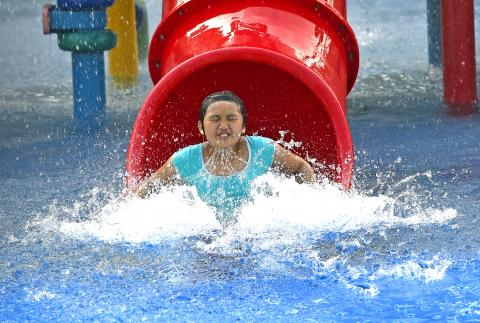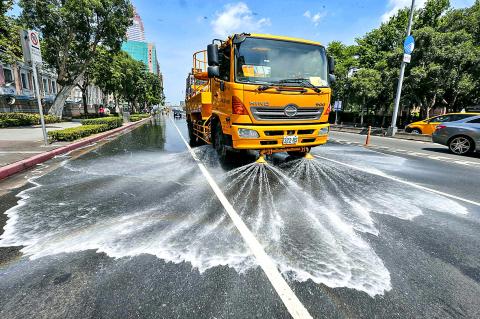The temperature in Taipei rose to 38.7°C yesterday afternoon, the city’s highest temperature in June the Central Weather Bureau has recorded since it was founded 120 years ago, the bureau said yesterday.
It was also the highest temperature that the nation has experienced so far this year, the bureau added.
Bureau weather forecaster Lin Chi-hui (林智暉) said Taipei’s previous record high for June was in 1954, when the mercury rose to 37.8°C. The same temperature reoccurred in June 2001.

Photo: Chen Chih-chu, Taipei Times
Bureau data showed the mercury in Taipei surged to 37.9°C at 12:54pm, breaking the record. It further climbed to 38°C, 38.1°C and 38.2°C at 1:16pm, 1:28pm and 1:34pm respectively.
The temperature then rose further to 38.5°C at 2:28pm and eventually peaked at 38.7°C at 2:46pm, the information showed.
Lin said that the high temperature was mainly caused by a strong Pacific high pressure system and a southwest wind that normally bring in warm air.

Photo: CNA
Apart from Taipei, she said nine other observation stations also recorded the highest temperature so far this year, including Taitung County’s Dawu (大武) Township (38.3°C), New Taipei City’s Banciao (板橋) District (37.6°C), Keelung City (37.4°C), Hsinchu City (36.5°C), New Taipei City’s Tamsui (淡水) District (35.7°C), Taichung City’s Wuchi District (梧棲)(34.8°C), Taoyuan City’s Sinwu (新屋) District (33.8°C), Hualien City (33.1°C) and Penghu County (32.7°C).
Bureau weather forecast center director Cheng Ming-dean (鄭明典) said on Facebook that the hot weather last month was part of a long-term trend.
“The longer trend for the development of the Pacific high pressure system is that it has become increasingly strong. Meanwhile, the high-pressure system tends to be strong if it is also preceded by a year with a strong El Nino effect,” Cheng said.

Photo: CNA
Cheng also cited the arrival of stationary fronts, which contribute to the continual rainfall, bringing a late plum rain season this year because they mostly stayed up north and varied in strength.
The Taipei Department of Environmental Protection sent water tankers to to cool off some of the city’s main arteries in an effort to combat the fierce heat seen yesterday.
The department yesterday sprayed water along Zhongxiao W Road, Zhongxiao E Road sections one through five, Roosevelt Road sections one through three, Nanjing E Road sections one through five, Bade Road sections two through four and Zhongshan S Road.
Department division chief Yan Ling-chen (顏伶珍) said that except on rainy or overcast days, water tankers are to be deployed to these road sections whenever temperatures reach 36°C.
To respond swiftly, the department uses temperatures recorded between 10am and noon as an indicator and dispatches the vehicles once the temperature reaches 34°C, Yan said.
The method has proven effective for cooling off the city, as the difference in temperatures measured in the asphalt before and after water is sprayed can be as much as 10°C, she said.
It also cuts airborne particulates measuring less than 2.5 micrometers in diameter (PM 2.5), helping to clean up the air around areas covered, she said.
Yan said that the task is performed in an environmentally friendly manner by using water recycled from the city’s Dihua (迪化) and Neihu (內湖) water treatment plants and from its three incineration plants.
To broaden the scope of areas covered, the department teamed up with companies operating on construction sites that agreed to spray water along 62 road sections as long as they are not overwhelmed by work, she said.
The department said that last year, it sprayed water over a total of 16,800km of roads, while construction companies covered 38,809km and cut an estimated 535.6 tonnes of total suspended particulates, including 23.3 tonnes of PM2.5.
The department said that it expects to spray water over a total of of 35,700km of roads this year, cutting 492.7 tonnes of particulates.

Taiwan yesterday denied Chinese allegations that its military was behind a cyberattack on a technology company in Guangzhou, after city authorities issued warrants for 20 suspects. The Guangzhou Municipal Public Security Bureau earlier yesterday issued warrants for 20 people it identified as members of the Information, Communications and Electronic Force Command (ICEFCOM). The bureau alleged they were behind a May 20 cyberattack targeting the backend system of a self-service facility at the company. “ICEFCOM, under Taiwan’s ruling Democratic Progressive Party, directed the illegal attack,” the warrant says. The bureau placed a bounty of 10,000 yuan (US$1,392) on each of the 20 people named in

The High Court yesterday found a New Taipei City woman guilty of charges related to helping Beijing secure surrender agreements from military service members. Lee Huei-hsin (李慧馨) was sentenced to six years and eight months in prison for breaching the National Security Act (國家安全法), making illegal compacts with government employees and bribery, the court said. The verdict is final. Lee, the manager of a temple in the city’s Lujhou District (蘆洲), was accused of arranging for eight service members to make surrender pledges to the Chinese People’s Liberation Army in exchange for money, the court said. The pledges, which required them to provide identification

Nine retired generals from Taiwan, Japan and the US have been invited to participate in a tabletop exercise hosted by the Taipei School of Economics and Political Science Foundation tomorrow and Wednesday that simulates a potential Chinese invasion of Taiwan in 2030, the foundation said yesterday. The five retired Taiwanese generals would include retired admiral Lee Hsi-min (李喜明), joined by retired US Navy admiral Michael Mullen and former chief of staff of the Japan Self-Defense Forces general Shigeru Iwasaki, it said. The simulation aims to offer strategic insights into regional security and peace in the Taiwan Strait, it added. Foundation chair Huang Huang-hsiung

’DISTORTION’: Beijing’s assertion that the US agreed with its position on Taiwan is a recurring tactic it uses to falsely reinforce its sovereignty claims, MOFA said The Ministry of Foreign Affairs (MOFA) yesterday said Chinese state media deliberately distorted Taiwan’s sovereign status, following reports that US President Donald Trump agreed to uphold the “one China” policy in a phone call with Chinese President Xi Jinping (習近平). During the more than one-hour-long call, Xi urged Trump to retreat from trade measures that roiled the global economy and cautioned him against threatening steps on Taiwan, a Chinese government summary of the call said. China’s official Xinhua news agency quoted Xi as saying that the US should handle the Taiwan issue cautiously and avoid the two countries being drawn into dangerous